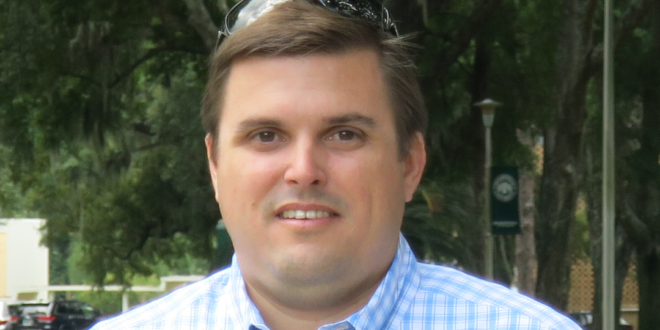Meet Jonathan McClow, who is part of the inaugural cohort of the Online Master of Science in Health Informatics in the Brooks Rehabilitation College of Healthcare Sciences.
What is your undergraduate degree in?
I earned my Bachelor of the Arts in Political Science from Valdosta State University in Georgia.

Why did you choose this JU program?
For many years I had considered pursuing a graduate school program at one of my local universities, but I had not found a program that matched my specific background and interests. I work as an analyst for a local hospital, and I wanted to find a program where the curriculum pertains to healthcare information technology, as Health IT is the focus of my work. When the creation of this program was announced, I immediately knew this was the program that would help build my knowledge to enable me to grow within my field.
I transitioned into Health IT about seven years ago, and I wish this program was available back then, as there are so many things you learn on your own the “hard way” along the way. This program efficiently condenses the knowledge of how healthcare is structured and also teaches you the technical skills that are needed to operate in today’s electronic health record (EHR) systems. Much of what I’m learning I am able to apply in real-time to my current full-time job, and I’m also able to contribute my perspective based on my professional experience.
I had never considered the online learning format before I learned of this program, but Jacksonville University’s solid reputation persuaded me to apply for the program. I gained a sense of comfort knowing this online program is supported by the JU professors from the Brooks Rehabilitation College of Healthcare Sciences on a traditional university campus. I have two kids, a one-year-old and a five-year-old, so being able to study in the Swisher Library on campus is a great benefit of being a JU student.
What do you like best about the program?
While I was unsure of the online format at first, I certainly appreciate the flexibility of the way that it is structured. Assignments are due each week, and you have the ability to work at your own pace. For those that work full-time and have a family, the flexibility is a major advantage. I like that JU will be offering a hybrid format that will consist of online assignments plus classroom lectures. In either format, I think the best part of the program is the professors. They each have their own distinct areas of specialty and share their knowledge and participate in two-way discussion through online discussion forums and scheduled interactive live-voice lectures with the class. The professors really seem to care that you understand the material and are committed to making themselves available for questions or clarification as needed.
What made you choose to pursue a career in this area?
I never planned to work in healthcare. Up until the 2007-2009 Great Recession I had worked in market research consulting for developers, builders and investors for over 10 years before transitioning into healthcare back in 2009. I joined the healthcare industry working in market research for a national urgent care chain before accepting a position in decision support for a local hospital. In my current position, I utilize structured programming language (SQL) coupled with business intelligence tools to deliver financial and statistical reporting solutions to the hospital. While I have non-clinical technical experience, I am learning so much from other students who work in a clinical role.
What do you hope to pursue after graduation?
After graduating I plan to apply what I have learned to become more efficient and add value to my current position. Also after graduating, I will consider re-enrolling in the MSHI program to obtain a Post-Baccalaureate Certificate in Health Data Analytics, as that shorter 12 credit-hour program directly aligns with my background.
 Wave Magazine Online Jacksonville University News Hub
Wave Magazine Online Jacksonville University News Hub
